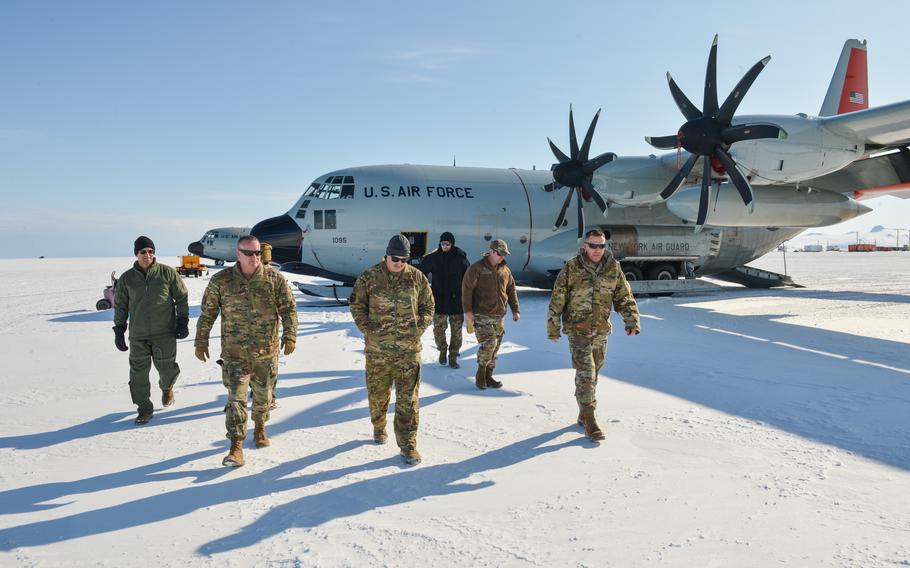
U.S. Air Force Gen. Ken Wilsbach, back left, Pacific Air Forces commander; Chief Master Sgt. David Wolfe, front left, PACAF command chief; and other PACAF representatives meet with Joint Task Force-Support Forces Antarctica (JTF-SFA) personnel next to an LC-130 at Williams Field, a compacted snow ice runway at McMurdo Station, Antarctica, Feb. 4, 2023. (RJ Stratchko/U.S. Navy)
As global powers vie for strategic and scientific dominance, Antarctica, once considered a distant and desolate landscape, has emerged as a new arena for international rivalry. China and Russia, in particular, have significantly ramped up their activities on the continent, displaying an assertiveness that underscores the need for a broader American geopolitical strategy.
This evolving dynamic poses not just a challenge to the traditional governance of Antarctica under the Antarctic Treaty System, but also presents direct risks to the national security of the United States. Historically a leader in Antarctic exploration and science, America today finds itself at a crossroads, with its response — or lack thereof — to these challenges shaping the future of its influence not only in Antarctica but in the global power structure writ large.
The strategic interests of China and Russia in Antarctica are multifaceted and are evident in their expanding footprints in the region. Access to the continent’s vast resources, including freshwater ice, fish stocks, and potential mineral and oil reserves are significant potential drivers, even though the current treaty suspends any such claims until at least 2048. Moreover, the geographical positioning of bases near the South Pole can facilitate satellite and communications intelligence, offering a vantage point that could be used to disrupt global communications in times of conflict.
This deployment of dual-use technology under the guise of scientific research further blurs the lines between civilian and military activities, raising concerns over the true intentions behind the expanding infrastructure in Antarctica of both these countries. In fact, China now has a burgeoning presence that extends to several satellite ground stations in the region, while Russia for its part also has several satellite relays and ground-based Navigation Satellite System (GLONASS) installations that can be found in the Antarctic.
While both countries assert that these facilities support crucial scientific research, experts fear that they could also potentially serve military objectives such as supporting anti-satellite warfare and improving the precision intercontinental ballistic missile trajectories.
By undermining the consensus-based international order that has governed the region since 1959 and challenging America’s ability to maintain a leadership role on the continent, China and Russia are greatly increasing the risk for conflict in the region. But despite these challenges to America’s national security, the response from policymakers in Washington has been tepid, characterized by a reluctance to reassert American leadership in the face of these changing geopolitical realities.
While the U.S. operates several research stations and has traditionally supported a trove of scientific studies on the continent, its investments and strategic focus have not kept pace with the ambitions of its adversaries. Chronic mismanagement by the National Science Foundation, which is currently in charge of America’s Antarctica initiatives, has led to a loss of resilience in the program and has seriously harmed morale on the ground. This gap presents a clear and present danger to American interests, signaling a potential ceding of leadership in a region of growing strategic importance.
Against this backdrop it has become clear that it is time for the United States to take a new approach in Antarctica. The Pentagon, in close coordination with scientific stakeholders, should take the lead in managing America’s operations on the continent moving forward. The Department of Defense, which has already been providing logistical support for the U.S. presence in Antarctic since the 1950s through Operation Deep Freeze, has the capability, resources and strategic foresight to bolster America’s presence in the region and enhance its scientific, environmental and monitoring activities on the continent.
None of this is to suggest the United States should violate the Antarctic Treaty or militarize Antarctica. But such actions can be taken within the confines of the treaty that does not prevent “the use of military personnel or equipment for scientific research or for any other peaceful purpose.” Instead, putting the Pentagon in charge would merely ensure that the U.S. does not fall behind in this new frontier of international competition and remains protected against any moves that could threaten its interests.
The time for action is now. As China and Russia continue to assert their presence in Antarctica, the United States must reevaluate its strategy and commitments to ensure it does not lose any more ground in this strategically vital territory. The Pentagon, with its unique capabilities and resources, should lead this charge, reinforcing America’s position not just in Antarctica but in the broader contest for global leadership.
E.G. “Buck” Shuler, a retired U.S. Air Force lieutenant general, is the former commander of Strategic Air Command’s 8th Air Force and was responsible for Strategic Air Command operations in the eastern half of the United States, Europe and the Middle East.